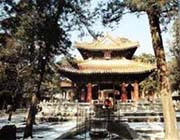Confucian Texts and Key Principles

Altar of Apricot. It was said to be the place where Confucius once delivered lectures to his disciples
Confucius has been credited with editing or writing parts of several classics of Chinese history and culture, including the Ch’un Ch’iu (Spring and Autumn Annals), Shi Ching (Book of Songs), Shu Ching (Book of History), and even commentaries to the I Ching, the ever popular book of oracles. But his essential teachings are contained in The Analects (Lun-yu), a compendium of his sayings and dialogues compiled by his disciples, and The Doctrine of the Mean (Chung Yung), a collection of Confucian tenets authored by his grandson, K’ung Chi. Those tenets include the Wu-ch’ang (“Five Constants”), the cardinal virtues of Confucianism, among them jen, or love of fellow humans, a sense of compassion based on the dignity of human life and great self-respect, and li, an evolution of the older sense of li as chivalric codes governing warfare and rituals of ancestor worship. As Confucius used the term, li meant a reverence and loyalty for others which includes knowing the right thing to do and doing it appropriately under any and all circumstances, and is the primary way of expressing jen. Li encompasses both ritual manners and respect for the Five Constant Relationships. The rest of the wu-ch’ang are i (“transformation”), a sense of moral uprightness that evokes the right response from selfless motives; chih (wisdom); and hsin (trust). The Confucian ideal is the chun-tzu, or “superior person,” the noble-minded or princely man who possesses jen and practices li.
Confucius had about 3,000 pupils, educated, compassionate people of the sort who would make good government officials. He saw himself as a reformer of a corrupt, nepotistic class stem, but did not openly attack traditional religious beliefs like ancestor worship. He also accepted the conventional Chinese deities and expressed his faith in Heaven that he was on a mission, but did not believe in asking the deities for help through prayer, and thought the divination and shamanism common to Chinese folk religion of his day were practices unworthy of a true chun-tzu. And so his paradigm was not individual mystical experience but honorable conduct in a social context. Still, his understanding of the individual was much more communal, less ego-identified than the Western ideal, and closer to the Eastern mystical notion of Union with the One. This sense is captured in the title of a book by the modern philosopher Herbert Fingarette, Confucius: The Secular as Sacred. And those Jungian-influenced authors who have been calling for the “re-enchantment” or “resacralization” of everyday life certainly owe a debt of spiritual gratitude to Confucius, whether they acknowledge him or not.


